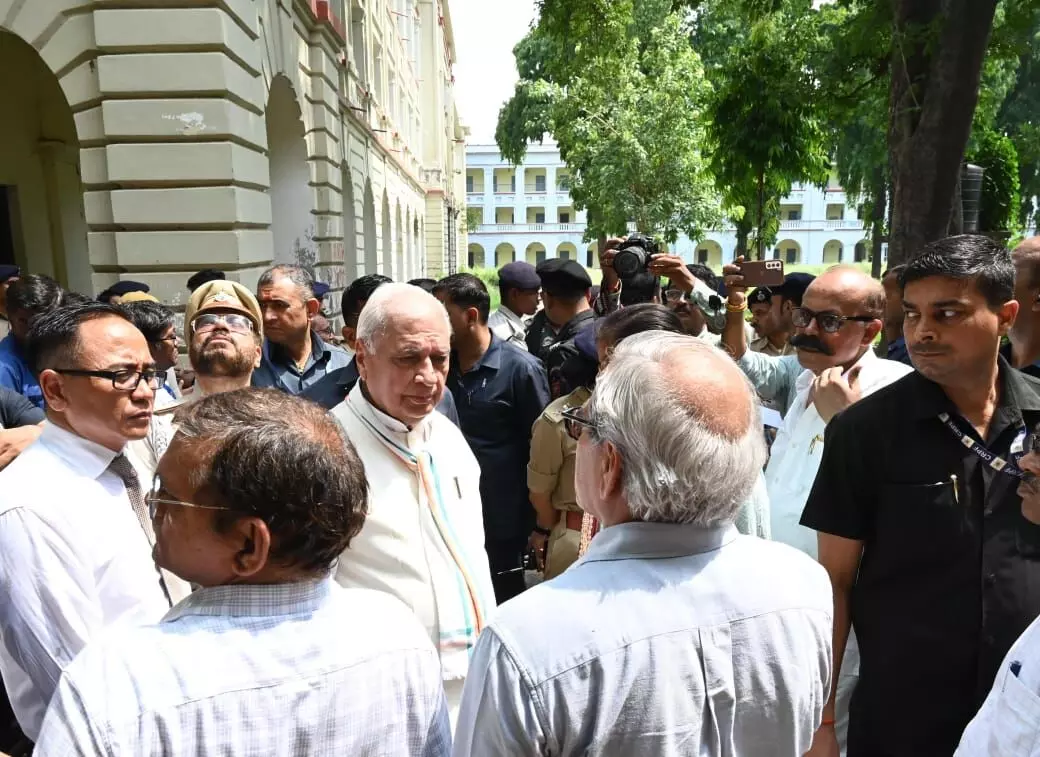Bihar Governor Slams State of Universities, Citing Anarchy and Corruption

Patna: On Saturday, Bihar Governor Arif Mohammad Khan, speaking at a public event in Patna, alleged that the universities in the state have been handed over to anarchic forces.
He was deeply moved by the recent bomb blast at the prestigious Bihar National College, which claimed the life of a student. As Chancellor of the universities, he expressed sorrow and concern, lamenting that even after four months, the Vice-Chancellor of Patna University had failed to submit a report to Raj Bhavan about this or similar earlier incidents.
Forty-five years ago, Jagannath Kaushal arrived in Bihar from Chandigarh to take office as the Governor. His own children enrolled at Patna University, symbolizing the prestige that Bihar’s academic institutions once held. Back then, governors actively participated in academic life. For instance, Kaushal once visited Bihar National College—now a site of controversy—to inaugurate an evening common room. During his address, he openly expressed frustration about the state of universities, saying, “If it were up to me, I’d shut down all universities and lock their gates.”
Sadly, not much has changed today.
In recent years, nearly all universities in the state have been engulfed in corruption. This might seem unbelievable to outsiders, but at one point, a Vice-Chancellor, Pro-Vice-Chancellor, Registrar, and 20 college principals were all jailed together on corruption charges. In a raid on the residence of Magadh University’s Vice-Chancellor Rajendra Prasad, the vigilance department recovered ₹3 crore in cash. Apart from him, three other Vice-Chancellors of the same university—Prof. Arun Kumar, Prof. Faheemuddin Ahmed, and Prof. B.N. Rawat—were also imprisoned.
Vice-Chancellors of other institutions like Veer Kunwar Singh University, Bihar University, Mithila University, and Kameshwar Singh Sanskrit University have also faced imprisonment.
In one shocking case, a Vice-Chancellor allegedly helped the wife of a powerful individual pass her MA exam. She appeared for only one out of eight papers, was marked absent for the rest, yet passed with first-class honors.
Two Vice-Chancellors have been accused of sexual harassment by female faculty members from their own universities.
Just last month, the registrar of Patliputra University filed a written complaint with the Governor and a police report, stating that he feared for his life due to threats from the Vice-Chancellor.
The condition of Bihar’s universities took a sharp turn for the worse after 1990, when Lalu Prasad Yadav became Chief Minister. The appointment of Vice-Chancellors began to ignore merit, with caste becoming the primary criterion. Universities were “distributed” among different caste groups, and appointments were made accordingly. Instead of Raj Bhavan, meetings of Vice-Chancellors began taking place at the home of Ranjan Prasad Yadav, a senior leader of the Rashtriya Janata Dal, located in a narrow alley off Arya Kumar Road. Key policy decisions, including teacher promotions and demotions, were made there. Even the chairpersons of the Intermediate Council and directors of higher education operated from that location.
Mohammad Shafi Qureshi, then Governor and Chancellor of Bihar’s universities, once told me, “Ranjan Yadav has now become the super chancellor.”
On one occasion, a Vice-Chancellor traveling with a politician on the Delhi–Patna Rajdhani Express had to personally clean up after the politician’s child defecated in the coach.
This stands in stark contrast to earlier times when distinguished scholars like Sharangdhar Singh, K.K. Dutt, Sachin Dutt, and Mahendra Pratap served as Vice-Chancellors—men who wouldn’t even visit the Education Minister’s office. In those days, Chief Minister Sri Krishna Singh would go to consult the Patna University Vice-Chancellor at his residence, which, until 1977, was located at the southern corner of Gandhi Maidan, where Hotel Maurya now stands.
Dr. Kedar Nath Prasad, a renowned economist, once protested in writing to the Chief Secretary when the District Magistrate sent police into Patna College without his consent. He reminded officials that he belonged to the Indian Education Service and was senior even to the Divisional Commissioner.
When the District Magistrate of Patna tried to halt examinations at Rajendra Agricultural University, Vice-Chancellor Atar Dev Singh resisted, declaring that the exams would go on. He too was an officer of the Indian Education Service.
If the situation in universities has worsened, then the Governors cannot escape responsibility either. Over the past 15 years, some Governors have faced open allegations that their close aides “sold” Vice-Chancellorships for as much as ₹2 crore each. At one point, Chief Minister Nitish Kumar even blocked the appointment of six Vice-Chancellors selected by Raj Bhavan.
Now, individuals backed by ruling party affiliates are being appointed. One Vice-Chancellor even claimed his name was forwarded by the “high command.”
In our time as students, Vice-Chancellors used to teach classes themselves. I still remember Sachin Dutt, who had retired as Finance Secretary of India and later became Vice-Chancellor of Patna University, teaching economics in the BA lecture theater at Patna College. Mahendra Pratap, a Cambridge PhD, taught English. George Jacob and A.K. Dhan, both former UPSC chairmen, also taught while serving as Vice-Chancellors.
Today, if the Governor feels pain and is moved to tears by the state of affairs, he has declared: “From now on, meetings will no longer be held at Raj Bhavan, but directly in the colleges.”
